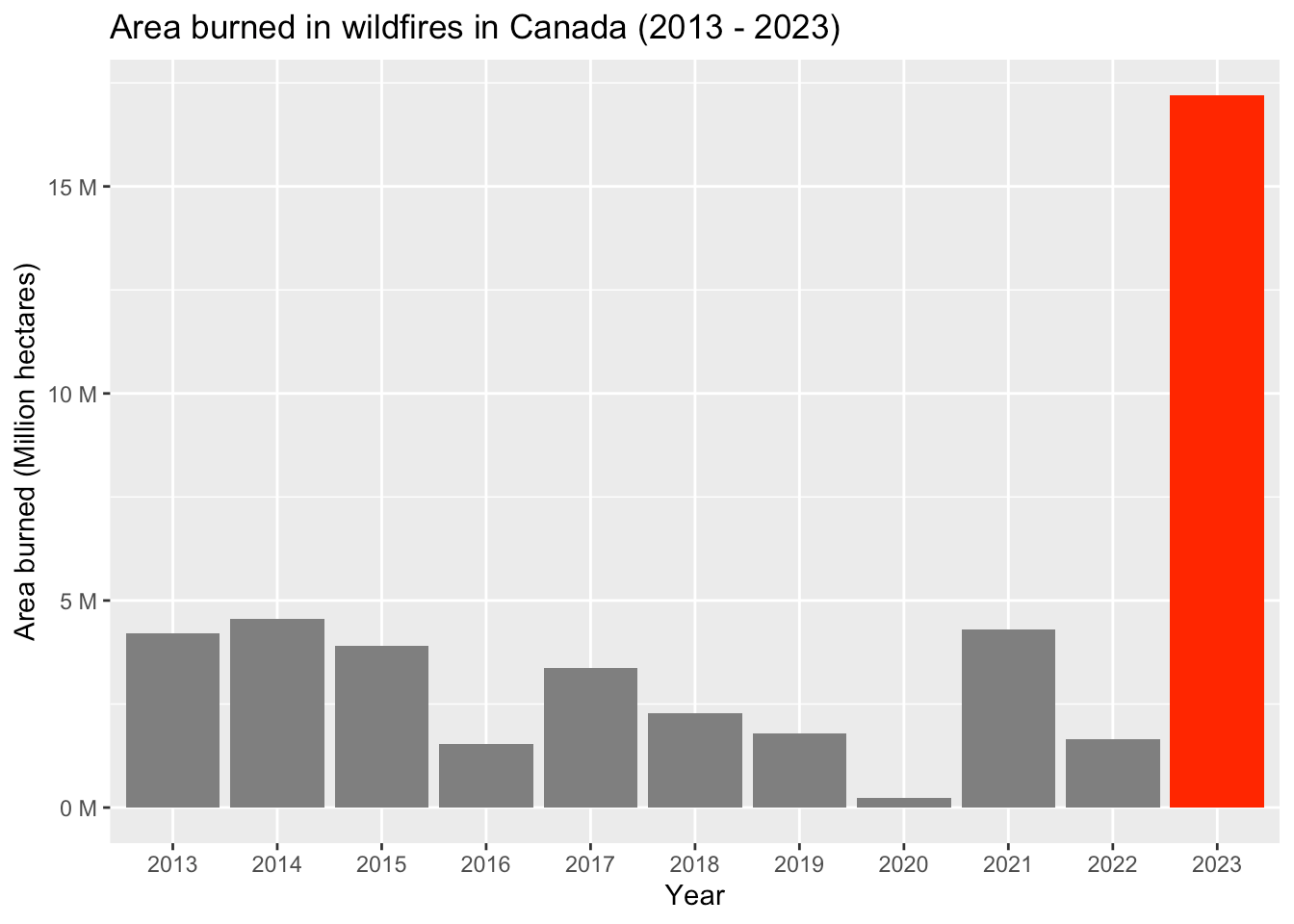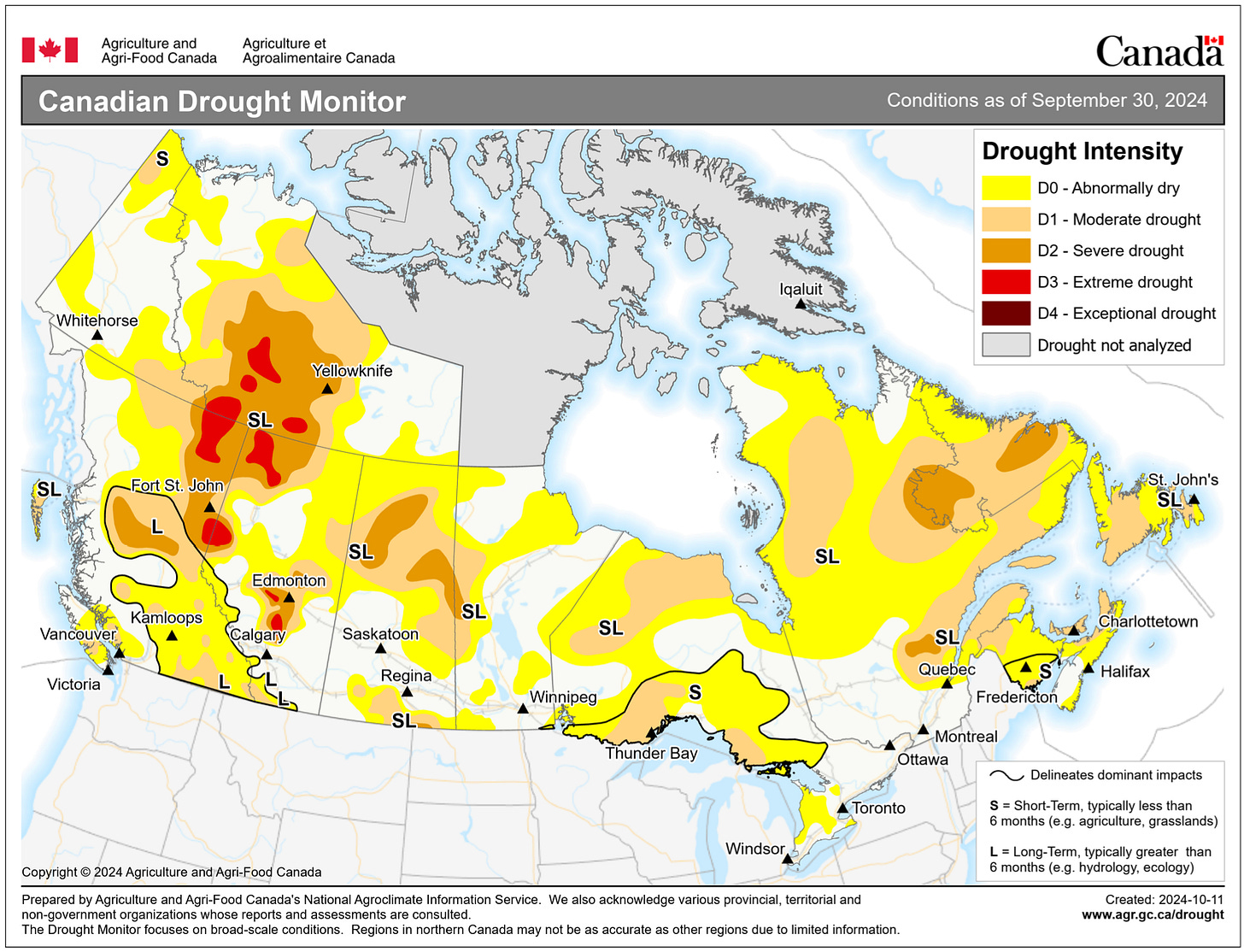Burning up the charts - Canadian wildfires in data
Recap on 2023's forest fire season in Canada and outlook for the future
The worst wildfire season in Canada on record (2023)
If you're anything like me, it feels like forest fire smoke has gotten much worse in the last couple years. In fact, 2023 was an exceptionally bad year for forest fires in Canada. Air quality warnings from Environment Canada punctuated my daily news and plans for outdoor activities changed around how bad the smoke was going to be. During 2023, my family was lucky that our summer plans were minimally affected, however, there were a couple days spent with friends at Clear Lake, Manitoba where the air was much less than clear and it hampered how much time we wanted to spend outdoors.
That said, forest fires, and the resulting smoke, is a regular feature of Canadian summers and I had not put together just how significant the 2023 wildfire season was. During the last ten years, an average of 2.8 Million hectares of forest burns each year. The chart below highlights that rather than part of an overall trend of climate change fueled increases, the 2023 forest fire season was a significant aberration from the norm. With about 17.2 million hectares burned, this was more than six times higher than a ten-year average leading up to that season.
The worst wildfire season on record...yet
The good news is that from a statistical perspective, it's unlikely that we will see anywhere close to the level of forest fire action experienced in 2023 in the near future. In fact, this is exactly what we experienced in 2024 when the total area of Canadian forest burned was less than one third of 2023 - 5.3 M hectares (2024) vs. 17.3 M hectares (2023). Even still, one must go back to 1995 to find a year in the recent past with more forest area burned that we experienced in 2024. The even worse news is that other data available points towards all the right conditions for 2025 and beyond to be worse than average for forest fires. As one can see in the map below prepared by Agriculture and Agri-Food Canada, nearly all of Western Canada lands somewhere in the range of Abnormally Dry to Extreme drought – exactly the conditions needed for wildfires to burn uncontrolled.
Bottom line - Hoping for the best in 2025
While that's about it for my summary of the 2023 and 2024 wildfire seasons, I did find a somewhat overwhelming amount of data available on the topic and I wanted to highlight that here for readers who might be interested in following up on anything on their own. I'm going to leave a bit of an addendum to this post and conclude by noting that I'm hoping for snow this winter and a wet spring as well. Western and North-West Canada needs it to keep another massive forest fire season at bay. If we don't get much precipitation, I fear that 2025 could again be filled with smoke across Western Canada, and potentially reaching across North America as it did in 2023. I'll be hoping for the best, and preparing for the worst, unfortunately.
Addendum - Sources of truth for Canadian wildfire information
Wildfire data
The main source for wildfire data in this post comes from the Canadian Interagency Forest Fire Centre (CIFFC). I started my research on the topic of Canadian forest fires by looking at Statistics Canada and other open data sets that would be available from the Federal Government. My first stop was this group of datasets published by Natural Resources Canada. To be honest, this felt like a bit of a bust. While the data was open, formatted well for analysis and published in a handy CSV format, the temporal coverage was about 3 years stale – only covering up to the year 2020 – and I wanted to see info about the 2023 fire season.
My search for open data on forest fires continued and I eventually found this page on a subdomain of Natural Resources Canada called the Canadian Wildland Fire Information System (CWFIS). This was a huge help as it served as a sort of hub with links to other relevant data sources. There is a ton of information contained in these pages, however, I was most interested in assessing just how bad was the 2023 fire season within an historical context, which lead me to the National Wildland Fire Situation Report.
Reading through the National Wildland Fire Situation Report, I found references to the Canadian Interagency Forest Fire Centre (CIFFC), which is just an absolute treasure trove of data and information on wildfires in Canada. Here are just a handful of the great things I found on the CIFFC website:






